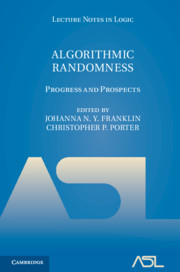Book contents
- Frontmatter
- Contents
- Preface
- 1 Key developments in algorithmic randomness
- 2 Algorithmic randomness in ergodic theory
- 3 Algorithmic randomness and constructive/computable measure theory
- 4 Algorithmic randomness and layerwise computability
- 5 Relativization in randomness
- 6 Aspects of Chaitin’s Omega
- 7 Biased algorithmic randomness
- 8 Higher randomness
- 9 Resource bounded randomness and its applications
- Index
9 - Resource bounded randomness and its applications
Published online by Cambridge University Press: 07 May 2020
- Frontmatter
- Contents
- Preface
- 1 Key developments in algorithmic randomness
- 2 Algorithmic randomness in ergodic theory
- 3 Algorithmic randomness and constructive/computable measure theory
- 4 Algorithmic randomness and layerwise computability
- 5 Relativization in randomness
- 6 Aspects of Chaitin’s Omega
- 7 Biased algorithmic randomness
- 8 Higher randomness
- 9 Resource bounded randomness and its applications
- Index
Summary
The field of algorithmic randomness studies the various ways to define the inherent randomness of individual points in a space (for example, the Cantor space or Euclidean space). Classically, this quest seems quixotic. However, the theory of computing allows us to give mathematically meaningful notions of random points. In the past few decades, algorithmic randomness has been extended to make use of resource-bounded (e.g., time or space) computation. In this survey we survey these developments as well as their applications to other parts of mathematics.
Keywords
- Type
- Chapter
- Information
- Algorithmic RandomnessProgress and Prospects, pp. 301 - 348Publisher: Cambridge University PressPrint publication year: 2020
- 1
- Cited by

